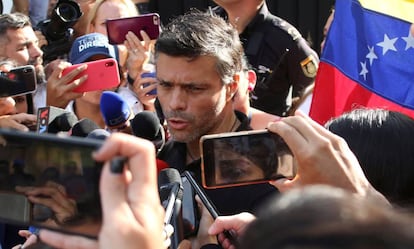Spain will “limit” political activity of Venezuelan dissident in its embassy
Leopoldo López, who has taken refuge at the Spanish ambassador’s residence in Caracas, gives Madrid an unexpected new role in the ongoing crisis

Spain’s acting foreign minister, Josep Borrell, said on Friday that the government will “limit” the political activities of Leopoldo López, a leading opposition leader who has taken refuge at the Spanish ambassador’s residence in Caracas after attempting to lead a military uprising against the government of Nicolás Maduro in Venezuela.
“Spain will not allow its embassy to turn into a center of political activism,” said Borrell, who is on an official trip to Lebanon. According to UN figures, at least five people have died in clashes between protesters and security forces since Tuesday, when López was seen in the company of interim Venezuelan president Juan Guaidó at a military base, where their call for a military uprising failed.
We will do everything possible to guide this process towards elections
Spanish government source
The recent events in Venezuela have put an unexpected spotlight on Spain. In just a few hours on Tuesday, a flurry of diplomatic activity resulted in Venezuelan opposition leader Leopoldo López’s admission into the Spanish ambassador’s residence in Caracas.
The pressure has since mounted for everyone involved: on Thursday, the Supreme Court of Venezuela issued an arrest warrant for López, arguing that he has violated the terms of his house arrest.
But the opposition leader has no intention of leaving the Spanish ambassador’s residence, and Spain does not see this latest turn of events as a problem for acting Prime Minister Pedro Sánchez, whose Socialist Party (PSOE) was the winner of the general election held last Sunday.
On Thursday night, the Spanish executive announced that it has no plans to turn over the politician to Venezuelan authorities. In a release, the Spanish government said it trusts that the government of Nicolás Maduro “will respect the inviolability of the Spanish ambassador’s residence.”
Madrid also noted that López, his wife Lilian Tintori and their 15-month-old daughter are at the residence of “their own free will.” Speaking to the media from the garden of the residence, López confirmed that they are being treated as guests, and will not be requesting political asylum.
The Spanish government also said that “Spain does not back any military coup” and instead supports a peaceful democratic process and the immediate holding of elections. It added that Juan Guaidó, the head of Venezuela’s National Assembly who has been recognized as the country’s acting president by more than 50 countries, including Spain, “was and remains the legitimate representative to carry out the transformation in Venezuela.”
Surprise move
Podemos
Back in Spain, Foreign Minister Borrell lamented statements made by Pablo Iglesias, the leader of the leftist Podemos party, who recently said that Guaidó "does not want free elections." In recent years Podemos has fought accusations of funding from the government of the late Hugo Chávez, mentor to Nicolás Maduro.
When López emerged from house arrest on Tuesday to appear in public next to Guaidó, Spanish authorities did not yet suspect that they would soon be playing host to the iconic political leader. The dissident was freed by members of the military who support Guaidó, and both men showed up together outside a military base on Tuesday in an effort to lead an uprising against the government that ultimately failed, plunging the country into further violence. Two minors have died in clashes with security forces, according to the opposition.
López first headed for the Chilean embassy, because its government is one of the most favorable to Guaidó, and because it was the nearest safe place. His wife and daughter were the first to arrive. But the Chilean ambassador’s residence is already housing other dissidents: Freddy Guevara and Roberto Enríquez have been living there since 2017. Later that same day, López and his family were taken to the residence of Spanish ambassador Jesús Silva Fernández.
The decision required prior approval from Spain’s acting foreign minister Josep Borrell. In order to avoid arrest or an assault during the trip between both residences, a diplomatic vehicle was used, very likely one from the Chilean embassy, said sources close to Venezuela’s opposition. It was reportedly López who asked to go to the Spanish ambassador’s residence.
Elections

The move gives Spain, which was already playing a leading role in the European Union on this matter, an even bigger say in the management of the Venezuela crisis. “It is still too early to say, but we will do everything possible, together with the contact group made up of European and Latin American countries, to guide this process towards elections,” said Spanish government sources.
On Thursday, Lilian Tintori left the ambassador’s residence during the day to visit the family home with members of the media. The place had been ransacked. López’s wife had denounced harassment by the intelligence services, but she was able to leave the Spanish ambassador’s residence and return without any trouble.
López, on the other hand, risks being detained and jailed again if he sets foot outside the premises. He was arrested in 2014 and was serving a 13-year prison sentence; he spent over two years in solitary confinement at Ramo Verde penitentiary, and two years under house arrest.
English version by Susana Urra.
Tu suscripción se está usando en otro dispositivo
¿Quieres añadir otro usuario a tu suscripción?
Si continúas leyendo en este dispositivo, no se podrá leer en el otro.
FlechaTu suscripción se está usando en otro dispositivo y solo puedes acceder a EL PAÍS desde un dispositivo a la vez.
Si quieres compartir tu cuenta, cambia tu suscripción a la modalidad Premium, así podrás añadir otro usuario. Cada uno accederá con su propia cuenta de email, lo que os permitirá personalizar vuestra experiencia en EL PAÍS.
¿Tienes una suscripción de empresa? Accede aquí para contratar más cuentas.
En el caso de no saber quién está usando tu cuenta, te recomendamos cambiar tu contraseña aquí.
Si decides continuar compartiendo tu cuenta, este mensaje se mostrará en tu dispositivo y en el de la otra persona que está usando tu cuenta de forma indefinida, afectando a tu experiencia de lectura. Puedes consultar aquí los términos y condiciones de la suscripción digital.








































